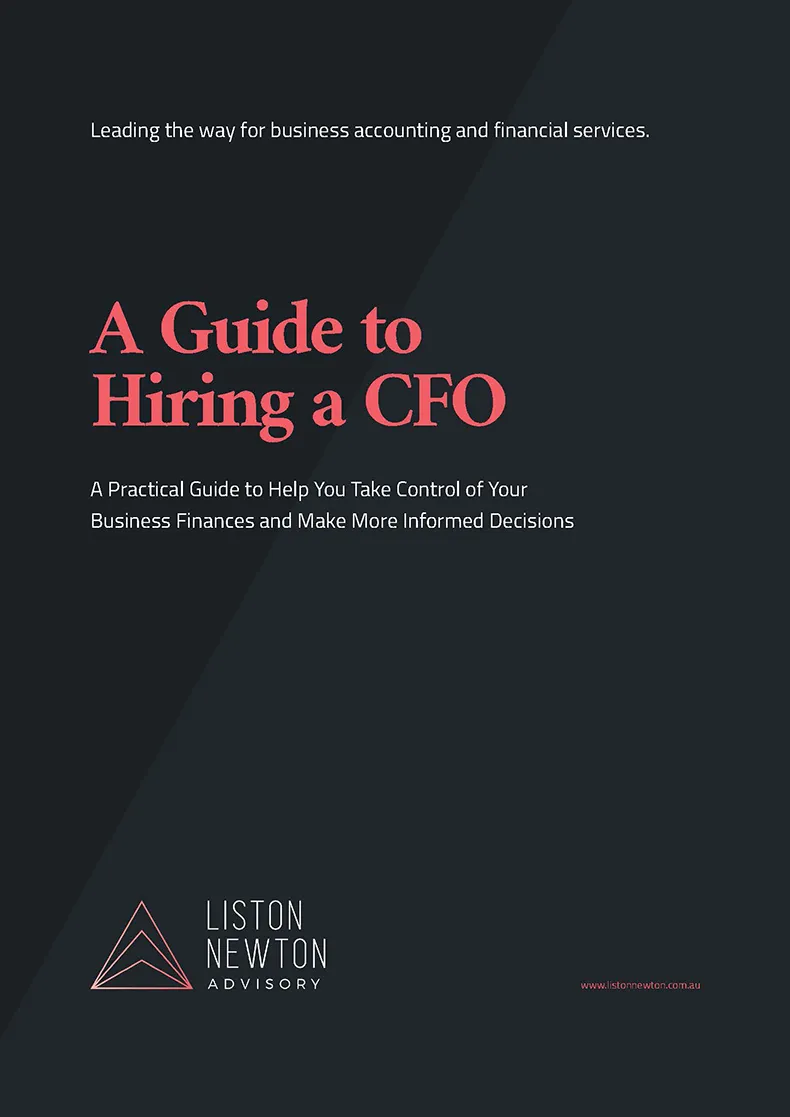Your CFO is your Chief Financial Officer. What they do, broadly speaking, is right there in their name: they look after your business’s finances.
That’s a task that the founders of many start-ups and small businesses tend to do themselves. You might be one of them. After all, who would know the ins and outs of your business better than you? Rolling the responsibilities of a full-time CFO into your existing CEO duties saves time and, frankly, money, especially if you’ve got a strong accounting and finance team in place to assist. But as your business grows, the demands of the role grow heavier.
If you’re interested in learning about the value of hiring a CFO, we’d wager it’s because you’re coming to realise you might need one. In this quick guide, we’ll explain:
- What a CFO actually does
- Why you need a dedicated financial director
- When you’ll know you’re ready to hire one
To round it off, we’ll explain how employing a dedicated Liston Newton virtual CFO can streamline your finances for exponential business growth.
What is a CFO?
You know what the letters stand for, but what does a CFO actually do?
A Chief Financial Officer oversees all of a company’s financial activities. But accounting for every dollar earned and spent is the most fundamental responsibility of their job. The CFO’s responsibilities also include:
- Bookkeeping
- Streamlining financial operations
- Financial data analysis
- Risk management
- Strategic planning
- Fundraising
As a senior executive, the CFO must then marshal the financial insights they’ve gathered to create financial statements for the business owner and shareholders. Their financial reports are crucial for senior management to understand the state of the business, and to mitigate risks as soon as possible.
Ultimately, your CFO will help you, as senior management, to accomplish two goals:
- Gain a clear and accurate understanding of your business’s financial health
- Develop strategies to improve its financial health
What hiring a CFO will do for your business
Let’s take a more in-depth look at the responsibilities of a CFO. We’ll break them down into seven essential duties.
- Monitoring transactions
Your CFO will monitor the cash flow of your business and track every dollar that goes in and out. They’ll ensure your accounts payable and receivable are up to date and that your employee payroll is prompt and accurate. - Guarding the treasury
They’ll keep a keen eye on all the financial assets under your business’s purview, and clarify your debt/equity positioning. - Process efficiency
Your CFO will ensure that the accounting systems and internal controls used by the accounting and financial management team are efficient and accurate. - Future-proof financial planning
One of their more demanding tasks, your CFO will make strategic recommendations to improve your business’s financial standing. - Financial forensics
Depending on the processes you currently have in place, you likely can’t precisely account for every dollar you spend or its ROI. Your CFO will create the architecture to do just that. - Compliance
A critical duty, your CFO will ensure that all of your financial reports are accurate to the decimal place so that you can stay compliant with all industry and government regulations. - Risk management
While the effects of a poor financial network are clear (if not catastrophic), the causes are often invisible. It’s not always obvious why inefficiencies arise and margins narrow. Your CFO will discover and allay those risks before they do any damage.
When to hire a CFO
As you can see, the responsibilities listed above vary in their difficulty. In fact, we’ve listed them (debatably, of course) in order of increasing complexity. As your business grows, you’ll come to realise you need an expert to focus on the more challenging financial issues within your organisation. But what kind of expert?
Here’s a general explanation of the kinds of financial leadership you’ll need, based on your company’s yearly revenue:
- $1-$5 million — you may need a financial controller
A financial controller is the head of accounts and can act as a de facto CFO for small businesses. They’ll ensure all of your accounting systems run smoothly. - $5-$30 million — you may need a fractional CFO
A fractional CFO is a part-time role in which a financial expert will perform high-level tasks such as uncovering structural inefficiencies and optimising your financial strategies. - > $30 million — you will need a full-time CFO
As high as CFO salaries can be, they pale compared to the losses a company can take without their help. If your business has reached this scale and you’re not a financial expert, your limitations will define the limits of your business’s potential. It’s time for a CFO to take over.
[free_strategy_session]
Want to know more about our CFO services?
A 90-minute strategy session gives you a clear plan for business growth.
- Get a better understanding of your business
- We generate a detailed report from your strategy session
- Understand your priorities and next steps
[/free_strategy_session]
Liston Newton’s virtual CFO offers world-class financial leadership
If you feel your business is ready for a financial controller or fractional CFO, contact Liston Newton. We are an in-person and virtual CFO offering the full spectrum of services you would expect from an in-house finance director.
Our virtual CFO services are designed to be accessible to businesses of all sizes, from small businesses to Australian national brands. By partnering with Liston Newton, you can rely on our 40 years of hard-won financial experience across several industries and markets, as well as our class-leading software to maximise your efficiency.
As our client, you will be awarded a dedicated Chief Financial Officer who can arrange in-person and virtual meetings to suit your convenience. You won’t find yourself on our backburner, and you will find our team take your business’s goals just as personally as an in-house CFO would.






